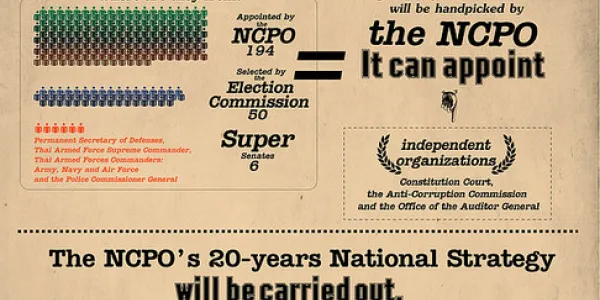<p> <a href="https://www.hrw.org/asia/thailand">Thailand’s</a> state Mahidol University should drop a disciplinary investigation against academics who criticized the Thai military junta, Human Rights Watch said today. The action is being carried out against staff members of the Institute of Human Rights and Peace Studies (IHRP), Southeast Asia’s longest-running graduate degree program in human rights studies.</p>
<p>Security officers have detained an anti-junta political dissident at the Dhammakaya Temple complex.</p>
<p>At 4 pm on 2 March 2017, about 10 soldiers and officers from the Department of Special Investigation (DSI) detained taxi driver Phaisan Chantapan, a regular participant anti-junta political activities, at the Dhammakaya Temple in Pathum Thani Province, north of Bangkok.</p>
<p>About two hours later, Phaisan told Prachatai that he had been taken to the Border Patrol Police Region 1 on suspicion of calling on Dhammakaya disciples to come to the temple.</p>
<p>Civil society groups oppose the junta’s plan to use the regime’s absolute power to speed up the process of registering pharmaceutical patents, warning the plan could cost billions of baht in increased drug costs.</p>
<p>On 1 March 2017, FTA Watch, a civil society group monitoring trade policies, and AIDs Access Foundation (AAF) submitted a letter to Gen Prayut Chan-o-cha, the junta leader and Prime Minister, urging him not to use Section 44 of the Interim Constitution to bypass normal regulations in registering pharmaceutical patents.</p>
<p>After almost three years of little progress, the Thai police have announced that they will not resist if the junta leader uses his absolute power to reform the police force, while a civil society group points out that decentralisation is the key to police reform. </p>
<p>On 1 February 2017, Police Watch (PW), a civil society group campaigning for police reform, issued a statement urging Gen Prayut Chan-o-cha, the junta leader and Prime Minister, to decentralise the administration of the Royal Thai Police (RTP).</p>
<p dir="ltr">Thailand’s junta leader has invoked absolute power to terminate three public agencies responsible for facilitating dialogue between civil society and the state.</p>
<p dir="ltr">Thai police have denied lawyers from the Deep South access to three suspects arrested for an alleged Bangkok bombing plot. </p>
By Kongpob Areerat |
<p dir="ltr">In a bid to lure investors, Thailand’s junta plans to evict some 300 citizens from their homes to construct a Special Economic Zone (SEZ) in the southern province of Songkhla. While the military’s development plans could boost a stalled economy, the country’s poor are paying the price.</p>
<p></p>
By International Commission of Jurists (ICJ) |
<p>Thailand should immediately end the use of <a href="http://icj2.wpengine.com/wp-content/uploads/2014/07/ICJ-Interim-Constitution-Articles-44-47-48.pdf">Article 44</a> of the Interim Constitution which gives the Head of the military junta <a href="http://www.icj.org/thailand-interim-constitution-seems-to-ignore-key-pillars-of-rule-of-law/">sweeping, unchecked powers</a> contrary to the rule of law and human rights, said the International Commission of Jurists (ICJ), today.</p>
By International Commission of Jurists (ICJ) |
<p dir="ltr">The Thai junta’s Order today phasing out the prosecution of civilians in military courts is a welcome step but the military government must do much more to comply with its international human rights obligations, said the International Commission of Jurists (ICJ) today.</p>
<p dir="ltr">The Thai Agricultural Minister has said that he might ask the junta leader to enact absolute power under Section 44 of the Interim Charter to build a controversial dam in a national park area, saying tigers have legs to run away from the water.</p>
By Cross Cultural Foundation (CrCF) |
<p>On 19 August 2016, the military officials have brought 13 men and two women, 15 of them, to the Crime Suppression Division (CSD), the Royal Thai Police, to process the arrest memos and to have them hear the charges filed against them by the military. They are all accused of forming the Revolutionary Alliance for Democracy Party and their act is considered an offence concerning being members of a secret society or a criminal association and having a political gathering of five persons and upward without getting permission from the Head of the National Council for Peace and Order (NCPO).</p>
<p dir="ltr">Thanks in part to the prospect of a return to elections, the junta-sponsored draft constitution has been approved by a majority vote via the controversial referendum. The attached question of whether an unelected-senate should be allowed to join the house of representatives in selecting the Prime Minister was also approved.</p>

